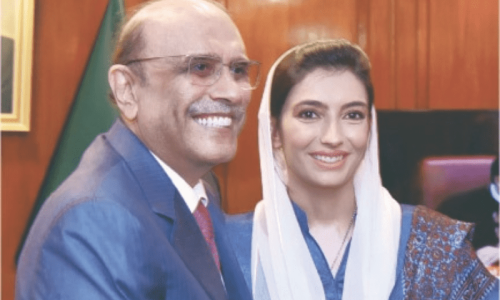ISLAMABAD: Downplaying a call for writing off Pakistan’s debt, the country’s economic team presented to international lenders on Monday a revised budgetary framework for the current financial year, envisaging a higher fiscal deficit of 4.7 per cent, substantial reduction in development outlays and additional taxation and reform measures.
Without naming his cabinet colleague Rehman Malik who a day earlier had called for writing off $50 billion international debt, Finance Minister Dr Abdul Hafeez Shaikh told foreign lending agencies and representatives of governments attending the concluding round of the Pakistan Development Forum (PDF) that asking for debt write-off was never an option before the government.
“It is a grave issue with great consequences for future prospects,” he said, adding that such a move could negatively affect sovereign credit rating and make it difficult for the country to raise money from the capital market. He said some non-economic people were attracted to such ideas but one had to see the debt profile of countries which had availed themselves of debt write-offs. “Nobody asks for it. We don’t want to be included in the list of those countries” and become international “pariah”.
The finance minister agreed to some comments that fiscal policy dominated the monetary policy which pushed up interest rates and the cost of borrowing for the government. He said the government was working hard to eliminate subsidies which were helping the rich at the cost of the poor. He said money injections into the Pakistan International Airlines did not benefit the poor, subsidised power was used by the rich for heating swimming pools and rich farmers benefited through commodity procurements. “The elimination of subsidies does not mean that we don’t care for the poor, but we have to use better ways and identify the poor.”
Finance Secretary Salman Siddique said the revenue target had been reduced to Rs1,655 billion from the budgeted Rs1,667 billion because of a three-month delay in introduction of reformed general sales tax (RGST). At the same time, Rs60 billion worth of additional taxes would be generated through 10 per cent flood surcharge on income tax liability, one per cent increase in special excise on dutiable items and improved accountability and audits. The objective is to improve tax-to-GDP ratio from the existing nine to 12 per cent in two years and 15 per cent by 2015, he said.
He said the federal government had fixed a deficit target of Rs685 billion, or four per cent of the GDP, in the budget but provincial budgets had increased the
estimate to Rs877 billion or 5.1 per cent. The deficit target has now been set at Rs812 billion (both provincial and federal) or 4.7 per cent of the GDP in consultation with the International Monetary Fund (IMF).
He said the restructuring of overall federal and provincial budgets would provide an additional cushion of Rs361 billion -- Rs224 billion at the federal and Rs137 billion at the provincial level. He said the consolidated expenditures had been curtailed by Rs295 billion after the floods, while Rs66 billion would be generated through fresh taxation.
The federal expenditure, he said, would be curtailed by Rs164 billion, including a massive Rs140 billion cut in the development programme. Another Rs24 billion saving will be achieved by freezing non-salary current expenditure at last year’s level.
The provincial governments will generate Rs6 billion additional revenue and cut their expenditures by Rs131 billion -- Rs111 billion in development spending and Rs20 billion in current expenditure.
Mr Siddique said fiscal reforms being introduced would improve public expenditure management by limiting fiscal deficit, replacing general with targeted subsidies and restructuring public sector entities. For this, the government is improving domestic resource mobilisation by introducing reformed GST, harmonising tax administration and strengthening risk-based tax audits that had been forgotten in the past.
He said the government had inherited a record 7.6 per cent fiscal deficit instead of the targeted four per cent in 2007-08 and overspending by the Punjab government in 2008-09 resulted in 5.2 per cent deficit instead of 4.7 per cent. In 2009-10, however, the 5.1 deficit target was breached again to 6.3 per cent because of higher than anticipated power sector subsidy, enhanced security related expenditures and FBR’s revenue shortfall.
He said that through an act of parliament the government had put a restriction on its borrowings of 10 per cent of the previous year’s revenue collection and provincial borrowings at equivalent of six weeks’ expenditure of the previous year. Likewise, the supplementary grants in extreme conditions would be restricted to 10 per cent of budget appropriations with the approval of the federal cabinet, withdrawing such powers from the prime minister.
The government, he said, would expand the private sector’s role in commodity operations and restrict public sector wheat procurement only for strategic reserves. He said that eight public sector companies were eating up about Rs219 billion which would be addressed with restructuring. He, however, said the power sector subsidies would have to be increased to Rs66 billion from Rs30 billion envisaged in the budget.














































Dear visitor, the comments section is undergoing an overhaul and will return soon.